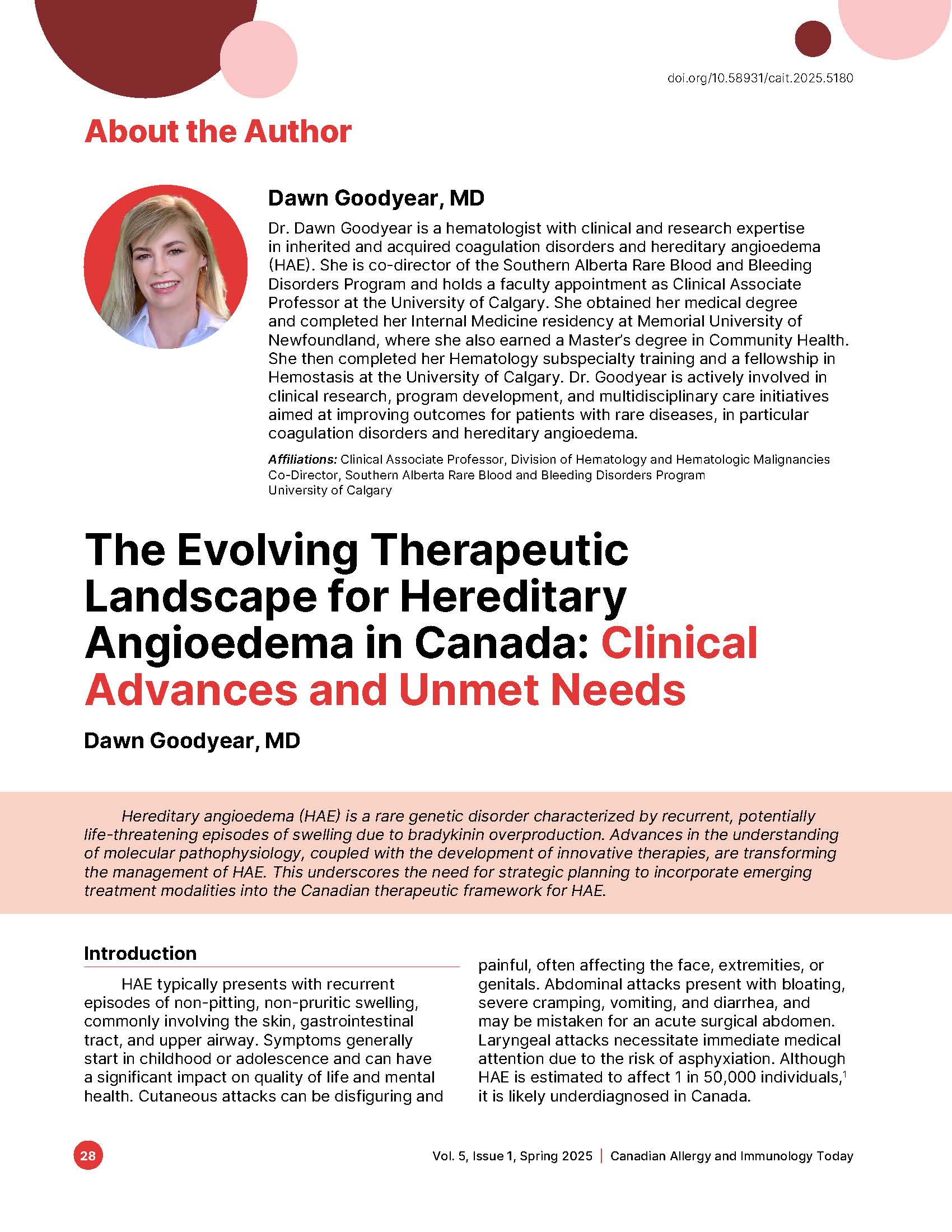The Evolving Therapeutic Landscape for Hereditary Angioedema in Canada: Clinical Advances and Unmet Needs
DOI:
https://doi.org/10.58931/cait.2025.5180Abstract
Hereditary angioedema (HAE) is a rare genetic disorder characterized by recurrent, potentially life‑threatening episodes of swelling due to bradykinin overproduction. Advances in the understanding of molecular pathophysiology, coupled with the development of innovative therapies, are transforming the management of HAE. This underscores the need for strategic planning to incorporate emerging treatment modalities into the Canadian therapeutic framework for HAE.
References
Busse PJ, Christiansen SC, Riedl MA, Banerji A, Bernstein JA, Castaldo AJ, et al. US HAEA Medical Advisory Board 2020 guidelines for the management of hereditary angioedema. J Allergy Clin Immunol Pract. 2021;9(1):132-150.e3. doi:10.1016/j.jaip.2020.08.046
Maurer M, Magerl M, Betschel S, Lumry W, Li HH, Longhurst H, et al. The international WAO/EAACI guideline for the management of hereditary angioedema – The 2021 revision and update. World Allergy Organ J. 2022;15(3):100627. doi:10.1016/j.waojou.2022.100627
Santacroce R, D’Andrea G, Maffione AB, Margaglione M, d’Apolito M. The genetics of hereditary angioedema: a review. J Clin Med. 2021;10(9):2023. doi:10.3390/jcm10092023
Betschel S, Badiou J, Binkley K, Borici-Mazi R, Hébert J, Kanani A, et al. The International/Canadian Hereditary Angioedema Guideline. Allergy Asthma Clin Immunol. 2019;15:72. doi:10.1186/s13223-019-0376-8
Lumry WR, Li HH, Levy RJ, Potter PC, Farkas H, Moldovan D, et al. Randomized placebo-controlled trial of the bradykinin B2 receptor antagonist icatibant for the treatment of acute attacks of hereditary angioedema: the FAST-3 trial. Ann Allergy Asthma Immunol. 2011;107(6):529-537. doi:10.1016/j.anai.2011.08.015
Craig TJ, Levy RJ, Wasserman RL, Bewtra AK, Hurewitz D, Obtulowicz K, et al. Efficacy of human C1 esterase inhibitor concentrate compared with placebo in acute hereditary angioedema attacks. J Allergy Clin Immunol. 2009;124(4):801-808. doi:10.1016/j.jaci.2009.07.017.
Banerji A, Riedl MA, Bernstein JA, Cicardi M, Longhurst H, Zuraw BL, et al. Effect of lanadelumab compared with placebo on prevention of hereditary angioedema attacks: a randomized clinical trial. JAMA. 2018;320(20):2108-2121. doi:10.1001/jama.2018.16773
Zuraw BL, Cicardi M, Longhurst HJ, Bernstein JA, Li HH, Magerl M, et al. Phase II study results of a replacement therapy for hereditary angioedema with subcutaneous C1-inhibitor concentrate. Allergy. 2015;70(10):1319-1328. doi:10.1111/all.12658
Wedner HJ, Aygören-Pürsün E, Bernstein JA, Craig T, Gower R, Jacobs JS, et al. Randomized trial of the efficacy and safety of berotralstat (BCX7353) as an oral prophylactic therapy for hereditary angioedema: results of APeX-2 through 48 weeks (Part 2). J Allergy Clin Immunol Pract. 2021;9(6):2305-2314. doi:10.1016/j.jaip.2021.03.057.
Riedl MA. Critical appraisal of androgen use in hereditary angioedema: a systematic review. Ann Allergy Asthma Immunol. 2015;114(4):281-288. doi:10.1016/j.anai.2015.01.003.
Sheffer AL, Austen KF, Rosen FS. Tranexamic acid therapy in hereditary angioneurotic edema. N Engl J Med. 1972;287(9):452-454. doi:10.1056/NEJM197208312870907
Craig TJ, Reshef A, Li HH, Jacobs JS, Bernstein JA, Farkas H, et al. Efficacy and safety of garadacimab, a factor XIIa inhibitor for hereditary angioedema prevention (VANGUARD): a global, multicentre, randomised, double-blind, placebo-controlled, phase 3 trial. Lancet. 2023;401(10384):1079-1090. doi:10.1016/S0140-6736(23)00350-1
Petersen RS, Bordone L, Riedl MA, Tachdjian R, Craig TJ, Lumry WR, et al. A phase 2 open-label extension study of prekallikrein inhibition with donidalorsen for hereditary angioedema. Allergy. 2024;79(3):724-734. doi: 10.1111/all.15948.
Maurer M, Anderson J, Aygören-Pürsün E, Lesage A, Lu P, Reidl M, et al. Efficacy and safety of bradykinin B2 receptor inhibition with oral PHVS416 in treating hereditary angioedema attacks: results of RAPIDe-1 phase 2 trial [AAAAI abstract 411]. J Allergy Clin Immunol. 2023;151(2 Suppl l): AB134. https://doi.org/10.1016/j.jaci.2022.12.419
Riedl M, Anderson J, Arcoleo F, Cancian M, Chapdelaine H, Conlon N, et al. Efficacy and safety of bradykinin b2 receptor antagonism with oral deucrictibant in prophylaxis of hereditary angioedema attacks: results of CHAPTER-1 phase 2 trial. J Allergy Clin Immunol. 2024;153(2). AB11
Riedl MA, Farkas H, AygörenPürsün E, Psarros F, Soteres DF, Staevska M, et al. Oral Sebetralstat for on-demand treatment of hereditary angioedema attacks. N Engl J Med. 2024;391(1):32-43. doi:10.1056/NEJMoa2314192.
Lumry W, Gunsior M, Cohen T, Bernard K, Gustafson P, Chung J, et al. Safety and pharmacokinetics of long-acting plasma kallikrein inhibitor navenibart (STAR-0215) in healthy adults. Ann Allergy Asthma Immunol. Published online March 28, 2025. doi:10.1016/j.anai.2025.03.016
Attune Pharmaceuticals. Attune pharmaceuticals announces pre-clinical data for ATN-249, an oral plasma kallikrein inhibitor for the treatment of HAE at AAAAI [Internet]. Published 6 March 2017. [cited 9 May 2025]. Available from: https://www.globenewswire.com/news-release/2017/03/06/931801/0/en/Attune-Pharmaceuticals-Announces-Pre-Clinical-Data-for-ATN-249-An-Oral-Plasma-Kallikrein-Inhibitor-for-the-Treatment-of-HAE-at-AAAAI.html
Longhurst HJ, Lindsay K, Petersen RS, Fijen LM, Gurugama P, Maag D, et al. CRISPR-Cas9 in vivo gene editing of KLKB1 for hereditary angioedema. N Engl J Med. 2024;390(5):432-441. doi:10.1056/NEJMoa2309149.
Cohn DM, Gurugama P, Magerl M, Katelaris CH, Launay D, Bouillet L, et al. CRISPR-based therapy for hereditary angioedema. N Engl J Med. 2025;392(5):458-467. doi:10.1056/NEJMoa2405734.
ClinicalTrials.gov Identifier: NCT05121376. A Gene Therapy Study of BMN 331 in Subjects With Hereditary Angioedema (HAErmony-1) [cited 2025 Apr 21]. Available from: https://clinicaltrials.gov/study/NCT05121376
Lee EY, Hsieh J, Caballero T, McCusker C, Kanani A, Lacuesta G, et al. Demographic and clinical characteristics of patients with hereditary angioedema in Canada. Ann Allergy Asthma Immunol. 2022;128(1):89-94.e1. doi:10.1016/j.anai.2021.07.015

